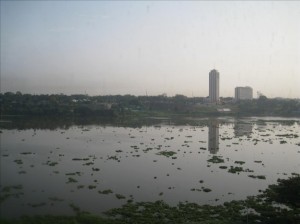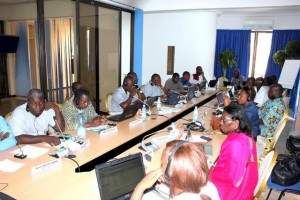 Abdulahi Traore, a fisherman, scouts the Ebire Lagoon that windless December morning, a forlorn look on his aging face. It’s about 10am in the morning as he guides the canoe past a body of seaweed, overlooking the imposing Hotel Ivoire, believed to be the biggest five-star hotel in the country.
Abdulahi Traore, a fisherman, scouts the Ebire Lagoon that windless December morning, a forlorn look on his aging face. It’s about 10am in the morning as he guides the canoe past a body of seaweed, overlooking the imposing Hotel Ivoire, believed to be the biggest five-star hotel in the country.
He says he has been out fishing since 6.30am and that he is disappointed with his catch today. According to him, in his 10 years as a fisherman the quality and quantity of fish from the water have steadily been on the decline.
“Due to the harmattan, the fish are hiding because the water is cold,” he suggests, managing a faint smile. He points out however that the pollution of the lagoon can also be attributed to its diminishing fishery stock.
Indeed, there are serious concerns among government officials and city dwellers in Abidjan, the Ivory Coast capital, over the unsavoury state of Ebrie Lagoon, a large expanse of salty water separated for almost all of its length from the Atlantic Ocean by a narrow coastal strip.
The 100 km (60 m) long lagoon linked to the sea by the Vridi Canal, once considered a symbol of the country’s beauty, has suffered from years of extensive pollution, endangering the four million inhabitants that live along its coastline.
Once a symbol of tourist attraction and proudly called the “pearl of the lagoons”, the Ebrie Lagoon is today an embarrassment to the sprawling city. Transformed into a dumping ground for urban and industrial waste several years ago, the water body has become contaminated with microbes and a layer of sedimentation because of pollution from worn-out sewage systems and garbage.
Nearly 60 percent of the industries in the country are concentrated around the lagoon area, contributing in large part to its degradation.
“The population is exposed to a number of contagious diseases, mainly cholera and typhoid fever,” says Ivorian environmental specialist, Thierry Mangle.
“The disappearance of the mangroves, a natural depolluting element that absorbs all the chemical particles in the water, has aggravated the situation,” he laments, fearing the advent of “an ecological catastrophe.”
The water quality is so bad water skiers abandoned the lagoon 20 years ago, a resident discloses, stressing that fishing has also considerably diminished. Around the Cocody Bay, the water is littered with plastic bottles, shoes, nylon, paper, bottle covers and cans.
But the lagoon is still home to some 150 species of rare shellfish, which are also threatened, he adds.
“It must be decided quickly. If not, we risk getting into an irreversible situation,” the source emphasises, adding that at least 2.2 trillion CFA Francs (33.6 billion euros, 50 billion dollars) will be necessary over the next 25 years in order to build decontamination and drainage works to regulate and control all the discharge into the lagoon.
Brice Delagneau, President of Amistad, a non-governmental organisation (NGO), stresses recently during a study visit to the lagoon by a team of journalists that government and the World Bank might soon embark upon a project to treat waste water before they are discharged into the sea.
“A Swedish NGO is assisting government in tackling the pollution problem in the Cocody Bay. We are working with the local community to sensitise them on how to treat their waste and keep the lagoon clean,” he says.
The journalists, who are from within the Abidjan Convention area, were at a training session in Abidjan. During the weeklong training, they were introduced to current and emerging issues on the marine and coastal environment, as they affect the lives of millions of people along Africa’s Atlantic seaboard.
“The workshop lead to the creation of a core of journalists willing to report authoritatively and frequently on the pressing marine and coastal environmental trends, concerns and solutions in the region,” Abou Bamba, the Convention’s coordinator, said.
 The journalists came from the print and broadcast media within the 22 countries which make up the Abidjan Convention area, spanning Mauritania to South Africa. Reporting on the pressing marine and coastal environmental trends in the region will require focus on issues such as the sources and activities causing pollution, some of which are the uncontrolled dumping of urban solid waste in coastal areas and waters; industrial effluent and other land-based activities.
The journalists came from the print and broadcast media within the 22 countries which make up the Abidjan Convention area, spanning Mauritania to South Africa. Reporting on the pressing marine and coastal environmental trends in the region will require focus on issues such as the sources and activities causing pollution, some of which are the uncontrolled dumping of urban solid waste in coastal areas and waters; industrial effluent and other land-based activities.
Some other issues of major concern to the Abidjan Convention, a regional seas activity of the United Nations Environment Programme (UNEP), are: overfishing; ocean governance; marine and coastal-based tourism; trends in anti-pollution policy and laws.
Funded by the Swedish International Development Agency, the workshop is the first of its kind for the Abidjan Convention region, whose coastline stretches for some 14,000 kilometres. The training is the result of a decision of the Conference of Parties (COP) to the Abidjan Convention in 2012 to raise public awareness of the Convention and of marine and coastal environmental issues.
Bamba’s words: “In general, in the Atlantic façade of Africa, media reporting on the environment is a gradual and growing practice. However, the focus is usually on inland concerns such as deforestation, land degradation and desertification, pollution of soils and water systems, waste water management, as well as endangered terrestrial flora and fauna. Rarely does reporting focus on marine and coastal environmental problems.
“Greater media coverage on these topics is, therefore, one of the reasons for and expected outcomes of this workshop. The awaited spin-off from this is increased public awareness, debate as well as legislative action to curtail marine and coastal environmental problems. Bringing the issue closer to the hundreds of millions of coastal Africans is designed to help change behavior and attitudes to marine and coastal pollution and destruction and spur greater community action to protect these environments. The anticipated result is greater well-being and economic benefits to coastal communities, whose livelihood are often determined by the health of the marine and coastal ecosystems.”
The Abidjan Convention is one of the regional seas programmes of UNEP. The Convention area contains some of the world’s richest fishing ground but which are now under pressure. Oil and gas exploration and exploitation is the newest activity in the Convention area, which raises potential oil spills with all their attendant consequences.
By Michael Simire
